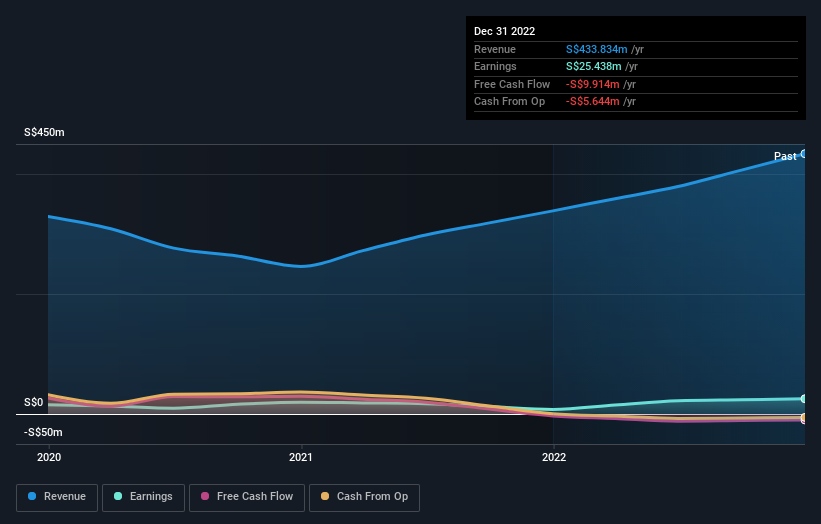Tai Sin Electric Limited (SGX:500) boasts of bullish insider sentiment with 64% ownership and they have been buying lately
Key Insights
Tai Sin Electric's significant insider ownership suggests inherent interests in company's expansion
51% of the business is held by the top 6 shareholders
A look at the shareholders of Tai Sin Electric Limited (SGX:500) can tell us which group is most powerful. We can see that individual insiders own the lion's share in the company with 64% ownership. In other words, the group stands to gain the most (or lose the most) from their investment into the company.
It's interesting to note that insiders have been buying shares recently. This could signal that stock prices could go up and insiders are here for it.
In the chart below, we zoom in on the different ownership groups of Tai Sin Electric.
Check out our latest analysis for Tai Sin Electric
What Does The Lack Of Institutional Ownership Tell Us About Tai Sin Electric?
We don't tend to see institutional investors holding stock of companies that are very risky, thinly traded, or very small. Though we do sometimes see large companies without institutions on the register, it's not particularly common.
There could be various reasons why no institutions own shares in a company. Typically, small, newly listed companies don't attract much attention from fund managers, because it would not be possible for large fund managers to build a meaningful position in the company. On the other hand, it's always possible that professional investors are avoiding a company because they don't think it's the best place for their money. Tai Sin Electric's earnings and revenue track record (below) may not be compelling to institutional investors -- or they simply might not have looked at the business closely.
Hedge funds don't have many shares in Tai Sin Electric. Looking at our data, we can see that the largest shareholder is the CEO Boon Hock Lim with 27% of shares outstanding. Chye Huat Lim is the second largest shareholder owning 6.6% of common stock, and Boon Hoh Lim holds about 6.3% of the company stock.
On further inspection, we found that more than half the company's shares are owned by the top 6 shareholders, suggesting that the interests of the larger shareholders are balanced out to an extent by the smaller ones.
Researching institutional ownership is a good way to gauge and filter a stock's expected performance. The same can be achieved by studying analyst sentiments. As far as we can tell there isn't analyst coverage of the company, so it is probably flying under the radar.
Insider Ownership Of Tai Sin Electric
The definition of company insiders can be subjective and does vary between jurisdictions. Our data reflects individual insiders, capturing board members at the very least. Company management run the business, but the CEO will answer to the board, even if he or she is a member of it.
I generally consider insider ownership to be a good thing. However, on some occasions it makes it more difficult for other shareholders to hold the board accountable for decisions.
Our information suggests that insiders own more than half of Tai Sin Electric Limited. This gives them effective control of the company. Given it has a market cap of S$184m, that means they have S$117m worth of shares. Most would argue this is a positive, showing strong alignment with shareholders. You can click here to see if those insiders have been buying or selling.
General Public Ownership
With a 36% ownership, the general public, mostly comprising of individual investors, have some degree of sway over Tai Sin Electric. While this size of ownership may not be enough to sway a policy decision in their favour, they can still make a collective impact on company policies.
Next Steps:
I find it very interesting to look at who exactly owns a company. But to truly gain insight, we need to consider other information, too. To that end, you should be aware of the 1 warning sign we've spotted with Tai Sin Electric .
Of course, you might find a fantastic investment by looking elsewhere. So take a peek at this free list of interesting companies.
NB: Figures in this article are calculated using data from the last twelve months, which refer to the 12-month period ending on the last date of the month the financial statement is dated. This may not be consistent with full year annual report figures.
Have feedback on this article? Concerned about the content? Get in touch with us directly. Alternatively, email editorial-team (at) simplywallst.com.
This article by Simply Wall St is general in nature. We provide commentary based on historical data and analyst forecasts only using an unbiased methodology and our articles are not intended to be financial advice. It does not constitute a recommendation to buy or sell any stock, and does not take account of your objectives, or your financial situation. We aim to bring you long-term focused analysis driven by fundamental data. Note that our analysis may not factor in the latest price-sensitive company announcements or qualitative material. Simply Wall St has no position in any stocks mentioned.
Join A Paid User Research Session
You’ll receive a US$30 Amazon Gift card for 1 hour of your time while helping us build better investing tools for the individual investors like yourself. Sign up here

 Yahoo Finance
Yahoo Finance 

